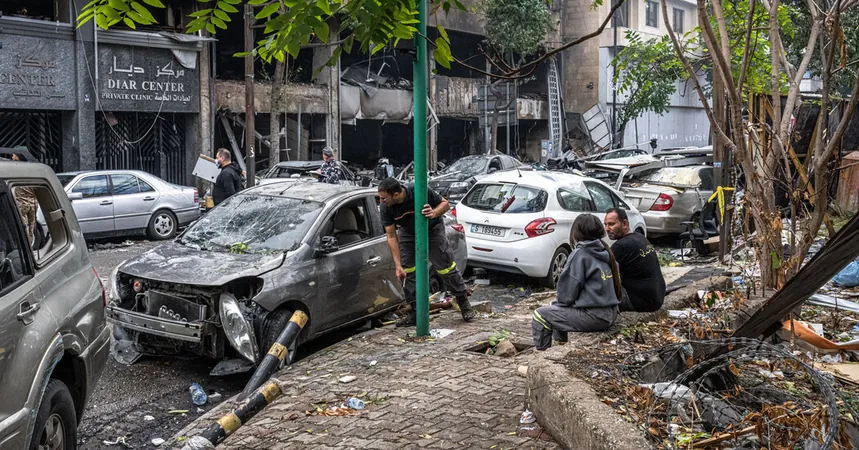
Breakthrough in Israel-Hezbollah Cease-Fire Talks: What You Need to Know!
2024-11-22
Author: Wei
Amidst weeks of intense conflict characterized by Israeli airstrikes and fierce ground combat with the Hezbollah militant group, signs of a potential cease-fire agreement are emerging, according to multiple U.S. and regional officials involved in the negotiations.
While details regarding enforcement and implementation remain unresolved, there is cautious optimism about the trajectory of the talks. Officials from Lebanon, Israel, and the U.S. provided insights on condition of anonymity, citing the sensitive and evolving nature of the discussions.
Proposed Cease-Fire Plan
The proposed cease-fire plan envisions a 60-day truce, during which Israeli forces would withdraw from southern Lebanon while Hezbollah would relocate its fighters north of the Litani River. This river runs approximately parallel to the Lebanon-Israel border. The Lebanese Army, along with a U.N. peacekeeping force, is expected to increase their presence in the border region, under a new enforcement mechanism led by the United States to ensure compliance from both parties.
Impact on Hezbollah
This escalation in fighting has severely impacted Hezbollah, with Israeli airstrikes claiming the lives of key leaders and significantly crippling the group's military capabilities. Estimates suggest that hundreds of thousands of Shiite Muslims aligned with Hezbollah have been displaced. This dramatic turn of events has pushed Hezbollah's remaining leadership, along with their Iranian backers, to consider a cease-fire agreement as a means to avert further losses.
Hezbollah's Position
Hezbollah's new leader, Naim Qassem, recently acknowledged in a video address that the group is open to indirect negotiations, contingent on a full halt of Israeli attacks on Lebanon and the preservation of Lebanese sovereignty. "We’ll see what the result is," he stated, reflecting the cautious nature of their position.
Israel’s Military Actions
Israel’s military, having launched a significant offensive seven weeks ago, claims to have dismantled much of Hezbollah’s military infrastructure along the border. Optimistic reports suggest that Hezbollah may have softened its stance, no longer demanding that a cease-fire in Lebanon coincide with one in Gaza, where Hamas has been in conflict with Israel.
Hezbollah's Ongoing Threat
Despite Israel's claims of success in targeting Hezbollah’s long-range missiles, the group continues to launch a barrage of shorter-range rockets, challenging Israel’s military operations. Ending this capability may prove to be a key focus during a potential truce, with hopes it will alleviate the ongoing threat to northern Israel.
Background of Conflict
The conflict initially flared following Hezbollah’s attacks in solidarity with Hamas after the surprise assault on southern Israel on October 7, 2023. The fighting has escalated significantly since September, with bombings and military incursions deepening the violence.
U.S. Mediation
Amos Hochstein, a senior envoy from the Biden administration, is mediating the negotiations. His efforts have included meetings in Lebanon and Israel, focusing on establishing a viable agreement. Given that Hezbollah is labeled a terrorist organization by the U.S., Hochstein's interactions in Lebanon are primarily with Nabih Berri, the Speaker of Parliament and a Hezbollah ally, while Israeli representatives include Prime Minister Netanyahu and high-ranking officials from his cabinet.
Challenges Ahead
Despite some reported progress, the specifics of implementation remain a challenge. The proposed agreement is based on a 2006 U.N. Security Council resolution which permits only the Lebanese Army and U.N. forces in southern Lebanon, though past failures to curb Hezbollah's military expansion in this region cast doubt on the arrangement’s effectiveness.
Potential for Lasting Peace
If the cease-fire materializes and holds for the designated 60 days, it could potentially evolve into a lasting peace agreement, particularly as the Trump administration prepares to take office and engage with these negotiations.
Israeli Military Confidence
Israeli military officials express confidence that they have significantly degraded Hezbollah's capabilities, claiming they are close to neutralizing the threat along the crucial border region. However, there is a recognition that a cease-fire is essential to halt ongoing rocket attacks, allowing civilians in northern Israel to return to their homes.
U.S. Officials' Insights
U.S. officials indicate that Israel shows a greater willingness to pursue a cease-fire in Lebanon compared to its stance regarding Gaza, reflecting an understanding that the simplest way to halt Hezbollah's rocket attacks may be through agreeing to a cease-fire.
Conclusion
As these talks progress, many are watching closely for what this could mean not just for Lebanon and Israel, but for stability in the wider Middle Eastern region. Stay tuned—this situation is evolving quickly, and it could impact geopolitics far beyond the battlefield!

 Brasil (PT)
Brasil (PT)
 Canada (EN)
Canada (EN)
 Chile (ES)
Chile (ES)
 España (ES)
España (ES)
 France (FR)
France (FR)
 Hong Kong (EN)
Hong Kong (EN)
 Italia (IT)
Italia (IT)
 日本 (JA)
日本 (JA)
 Magyarország (HU)
Magyarország (HU)
 Norge (NO)
Norge (NO)
 Polska (PL)
Polska (PL)
 Schweiz (DE)
Schweiz (DE)
 Singapore (EN)
Singapore (EN)
 Sverige (SV)
Sverige (SV)
 Suomi (FI)
Suomi (FI)
 Türkiye (TR)
Türkiye (TR)